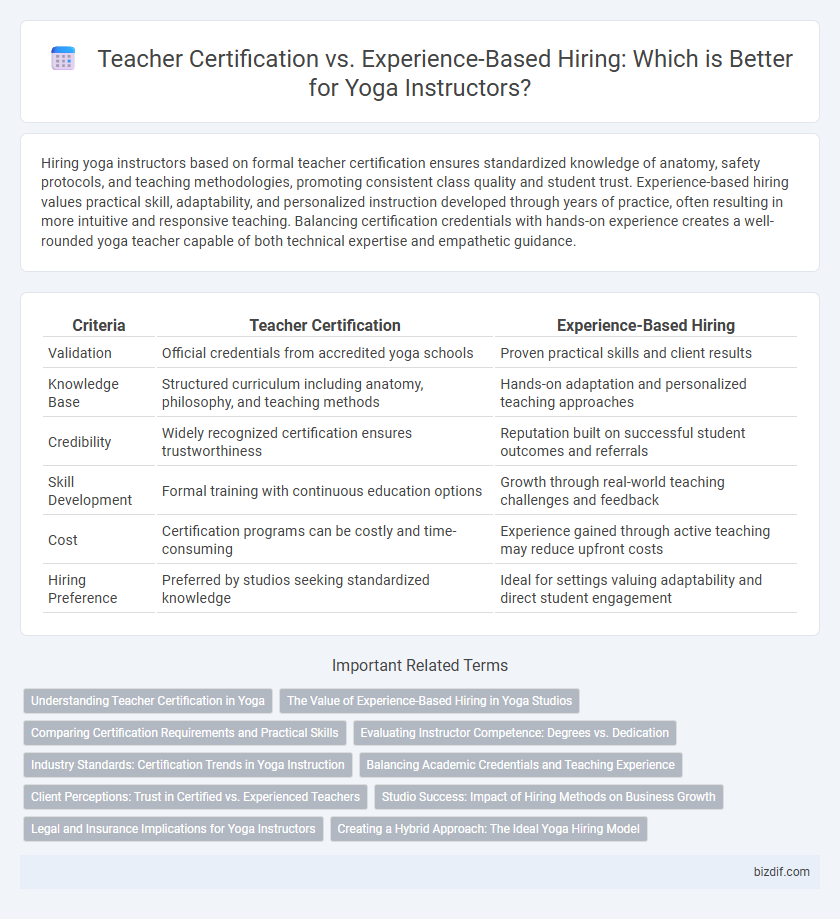Hiring yoga instructors based on formal teacher certification ensures standardized knowledge of anatomy, safety protocols, and teaching methodologies, promoting consistent class quality and student trust. Experience-based hiring values practical skill, adaptability, and personalized instruction developed through years of practice, often resulting in more intuitive and responsive teaching. Balancing certification credentials with hands-on experience creates a well-rounded yoga teacher capable of both technical expertise and empathetic guidance.
Table of Comparison
| Criteria | Teacher Certification | Experience-Based Hiring |
|---|---|---|
| Validation | Official credentials from accredited yoga schools | Proven practical skills and client results |
| Knowledge Base | Structured curriculum including anatomy, philosophy, and teaching methods | Hands-on adaptation and personalized teaching approaches |
| Credibility | Widely recognized certification ensures trustworthiness | Reputation built on successful student outcomes and referrals |
| Skill Development | Formal training with continuous education options | Growth through real-world teaching challenges and feedback |
| Cost | Certification programs can be costly and time-consuming | Experience gained through active teaching may reduce upfront costs |
| Hiring Preference | Preferred by studios seeking standardized knowledge | Ideal for settings valuing adaptability and direct student engagement |
Understanding Teacher Certification in Yoga
Teacher certification in yoga provides a structured validation of skills and knowledge, ensuring instructors meet standardized competency and safety guidelines. Certification programs often include anatomy, philosophy, and teaching methodology, equipping teachers with comprehensive expertise to guide students effectively. Experience-based hiring values practical teaching skills and real-world proficiency but may lack the consistent quality assurance that formal certification offers.
The Value of Experience-Based Hiring in Yoga Studios
Experience-based hiring in yoga studios prioritizes practical teaching skills and real-world client engagement over formal certification, often resulting in instructors who adapt naturally to diverse student needs and classroom dynamics. While certification ensures a foundational knowledge of yoga philosophy and anatomy, seasoned instructors bring nuanced understanding and intuitive adjustments that enhance personalized learning experiences. Studios valuing experience-based hiring frequently report higher student retention rates and more vibrant class environments due to the authentic, practiced expertise their teachers contribute.
Comparing Certification Requirements and Practical Skills
Yoga teacher certification programs provide structured curricula emphasizing anatomy, philosophy, and safety standards, ensuring standardized knowledge across instructors. Experience-based hiring prioritizes practical teaching skills and adaptability gained from hands-on sessions and real-world class management, which may not be covered comprehensively in certification courses. Balancing formal certification with extensive practical experience often results in the most effective yoga instructors.
Evaluating Instructor Competence: Degrees vs. Dedication
Evaluating instructor competence in yoga often contrasts formal teacher certification with experience-based hiring, where degrees provide standardized knowledge of anatomy, pedagogy, and safety protocols essential for maintaining professional standards. Dedication demonstrated through years of consistent practice and client feedback reveals practical skills and adaptability that certifications alone may not capture. Combining verified credentials with tangible teaching experience ensures a comprehensive assessment of an instructor's ability to deliver effective yoga sessions.
Industry Standards: Certification Trends in Yoga Instruction
Certification trends in yoga instruction have increasingly shaped industry standards, with many studios prioritizing teachers who hold nationally recognized credentials such as those from Yoga Alliance. While experience-based hiring values practical teaching skills and client rapport, certified instructors demonstrate adherence to structured training, safety protocols, and ethical guidelines. The growing demand for certified teachers reflects a broader movement toward professionalization and accountability in the yoga industry.
Balancing Academic Credentials and Teaching Experience
Balancing academic credentials with teaching experience is crucial in yoga instruction to ensure both theoretical knowledge and practical skills. Teacher certification programs validate understanding of anatomy, philosophy, and safety, while hands-on experience develops effective communication and adaptability to diverse student needs. Employers seeking well-rounded instructors prioritize candidates who combine formal training with years of teaching practice to foster authentic and safe yoga experiences.
Client Perceptions: Trust in Certified vs. Experienced Teachers
Clients often perceive certified yoga teachers as more credible due to the standardized training and recognized credentials that ensure foundational knowledge and safety. However, experienced teachers tend to build trust through personalized guidance and proven teaching effectiveness over time. The balance between certification and practical experience significantly influences client confidence and satisfaction in yoga instruction.
Studio Success: Impact of Hiring Methods on Business Growth
Teacher certification in yoga often ensures standardized knowledge of anatomy, teaching methodologies, and safety protocols, directly influencing studio credibility and client trust; however, experience-based hiring brings real-world adaptability and client engagement skills that can drive retention and word-of-mouth growth. Studios prioritizing certified instructors typically see enhanced brand positioning and reduced liability risks, while those valuing experience may experience faster class innovation and tailored student interactions. Balancing certified expertise with practical teaching experience correlates strongly with optimized class quality, increased client satisfaction, and sustainable business expansion in competitive yoga markets.
Legal and Insurance Implications for Yoga Instructors
Yoga teacher certification provides verified credentials that fulfill legal requirements and satisfy insurance providers, ensuring coverage and liability protection. Hiring based solely on experience can lead to inadequate legal compliance and increase risks of denied insurance claims in the event of accidents. Certified instructors typically benefit from professional liability insurance, reducing financial exposure for both the teacher and the yoga studio.
Creating a Hybrid Approach: The Ideal Yoga Hiring Model
Creating a hybrid approach to yoga hiring combines teacher certification credentials with practical experience, ensuring well-rounded instructor expertise. Certified training provides foundational knowledge and adherence to safety standards, while hands-on teaching experience fosters adaptability and deeper student connection. This model maximizes instructional quality by valuing both formal education and experiential insight in yoga teaching.
Teacher certification vs Experience-based hiring Infographic

 bizdif.com
bizdif.com